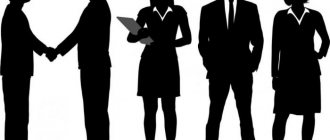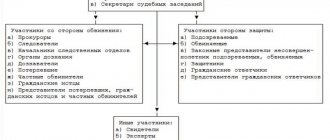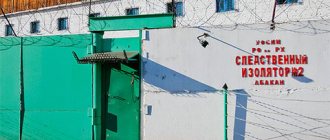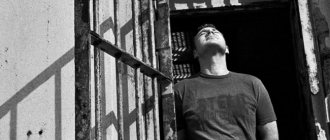According to the Criminal Procedure Code, participants in criminal proceedings are persons who take part in criminal proceedings. Chapters five to eight of the Code of Criminal Procedure are set aside to classify the participants in relation to the beginning of the proceedings: accusing, defending and neutral. Combining some functions, for example: defense attorney and representative of the civil defendant, is possible; but there are statuses that cannot be combined with any others (for example: secretary, expert).
Multi-channel free hotline Legal advice on criminal law. Every day from 9.00 to 21.00
Moscow and region: +7 (495) 662-44-36
St. Petersburg: +7 (812) 449-43-40
general information
The investigation is divided into a pre-trial stage (its full name is preliminary investigation) and a judicial stage (where the judicial investigation, debate, sentencing, appeal and review are successively replaced).
The preliminary investigation, depending on the danger of the tort and the complexity of the case, takes place in the order of inquiry (for simpler cases) and preliminary investigation (for murders, robberies, etc.). In movies, books, even in crime literature, a preliminary investigation is called an investigation, but according to the Code of Criminal Procedure, what is done before the indictment is signed is preliminary. The final investigation is underway in court.
Before the start of the judicial investigation, the position of the accused is clarified in a preliminary hearing (he admits guilt, no, he admits partially). In a judicial investigation, evidence and its refutation are considered.
The debate proceeds as follows:
- presentation by the prosecution;
- presentation of the defense;
- replica of the accusation;
- protection replica.
In debates, the last remark is always on the defense side.
After the last word of the defendant, none of those present should add anything; The court retires to deliberate and pronounce a verdict. Conviction based on the verdict of the 1st instance comes into force after ten days, unless there is an appeal.
When considering complaints in higher authorities, the proceedings in the appeal are almost the same as in the 1st instance (but shorter in time), in cassation the proceedings have more differences.
The most important participants in the process on the prosecution side are the prosecutor and the victim. It is possible to have a case without a prosecutor (when private charges are brought against victims) and without a victim (in formal cases such as the illegal acquisition of special equipment for wiretapping).
The legislation allows for the replacement of such persons as, for example, a secretary and a representative. Some replacements are technical (a new prosecutor or secretary is allowed at each hearing), but if a judge is replaced, the trial of the case begins again.
Such a replacement is the result of a challenge if it is accepted by the court. The challenge is often rejected by the single judge (he himself determines whether to conduct the hearing after the party’s application or not), but some prefer to grant challenges to themselves in order to avoid further complaints about the bias of the verdict.
If more jurors have dropped out than there were reserves, then the process must begin again, as in the case of a judge's challenge. Violation of the principle of immutability of the composition of the court leads to such consequences as the cancellation of the verdict on formal grounds.
All of the above must comply with public standards of morality and ethics.
Consideration of cases on appeal
The main task of this stage is the transformation of regulations that have not yet entered into legal force. First of all, their legitimacy, reasoning and impartiality are checked. The action of this stage is provided exclusively for acts adopted by the world priest of justice.
The stage begins from the moment the appeal is filed and ends with the cancellation of the decision or leaving the latter unchanged or terminating the proceedings. Acts as a kind of means of correcting the mistakes of the lower palace of justice.
An appeal may lead to a review of the case by a higher authority, which will either agree with the previously adopted resolution or issue a new conclusion that significantly changes the position or cancels the previously adopted one in a certain part.
The main feature of an appeal and its difference from a cassation is the review by a higher body of the very essence of the ruling made by a lower one.
Signs of appeal:
- Verification of an act that has not entered into force.
- Analysis on questions of fact.
- Examination of the evidence, and newly presented ones as well.
- Consideration on the merits.
- Worsening of the situation of the accused.
- Expanding the subject composition of participants (translators, experts).
- The start of the proceedings no later than two weeks after admission.
The above characteristic features will distinguish one type of appeal from another.
The result of an appeal is a newly adopted conclusion or a decision to uphold the previous conclusion without reorganization.
Court
The composition of the court can be one of two:
- Sole (magistrate or federal judge).
- Collegial (three federal judges or one federal and a jury).
The classification of a crime at the appropriate level of court is determined by the Code of Criminal Procedure.
The qualification (incorrectly - classification) class of a judge depends on the level of the court, length of service and scientific achievements. From June 1, 2022, there are two types of juries in Russia: eight people in regional courts, and six people in district courts.
When forming a jury, the presiding judge gives them an introduction to the upcoming process: he warns them that they should not talk to anyone outside the jury on topics related to the criminal case being examined.
When a case is considered by a panel of three judges, the decision is made by a majority vote (two are enough), so there is a dissenting opinion from the one who does not agree with his colleagues. He has the right to attach his opinion in writing to the case. The jury remaining in the minority does not have such a right: the secrecy of the jury deliberations requires that no one know for which version of the verdict a member of the panel voted.
In an effort to achieve greater openness and transparency, the state several years ago introduced a service for publishing and tracking the schedule of hearings and texts of sentences in district and regional courts: the electronic system “Justice”, accessible on the Internet.
A search of a home (as opposed to other premises) is carried out only with the permission of the court. If there is no time to go to court (the criminal will destroy the evidence), the investigator can conduct a search without such a decision, but after that he is obliged to notify the judicial authority within three days. If it turns out that the event was carried out unreasonably, the evidence found will be illegal.
Review of cases under supervisory procedure
The supervisory levels in Russia are:
- presidiums of the Supreme Courts of the Republics, territories, regions, federal cities, autonomous regions, autonomous districts;
- Judicial Collegium for Criminal Cases of the Supreme Court of the Russian Federation;
- Presidium of the Supreme Court of the Russian Federation.
When the proceedings of the accomplishment were not carried out in the supervision of the region, then it will not be considered first at the upper level.
The basis of the study is protest. Supervision is carried out no later than 15 days from the date of receipt of the case, and in a higher authority - a month is given. The presence of a prosecutor is generally required.
The case is announced by the chairman or a member appointed on his orders who has not previously taken part in the proceedings of this act. The announcer states the circumstances of the committed act, previously made determinations, conclusions, and the essence of the protest. He has the right to ask questions.
Next, the speech is transferred to the prosecutor in order to support the protest, after which the guardians of objectivity put forward decisions, and the Judicial College - a determination that is adopted by a majority vote.
When investigating an offense at the supervisory level, new materials that arise as a result of the discovery of new grounds cannot be examined. In this situation, the conclusion is canceled and the analysis of the act on its merits begins again from the very beginning.
The accusation takes place without going to the deliberation room. If there is an equal number of votes for and against, the determination is subject to cancellation as invalid.
Judges do not have the right to abstain from voting. If there is a dissenting opinion, it is recorded in a legal manner.
Participants in criminal proceedings on the part of the prosecution
Prosecutor
The prosecutor's office carries out a control function at the stage of verification and pre-trial proceedings: it cancels refusal decisions and returns them back to the police for additional verification, and transfers cases between departments.
Before the trial, the prosecutor examines the result of the work and signs the indictment. The terms of reference of the prosecutor's office are contained in Article 37 of the Code of Criminal Procedure. The head of the prosecutor's office has the right to disagree with the position of subordinate employees, even in an appeal, and to refuse further charges or reduce the volume.
Investigator
This official has the main pre-trial function: collecting evidence in the case, recording it and filing it. For imputation, it is necessary to prove the subjective side of the crime: to confirm that the criminal was aware that he was breaking the law.
To carry out prosecution, the investigator is vested with the following key powers:
- Making a decision to initiate a case.
- Carrying out procedural activities.
- Issuance of binding instructions.
The investigator, on the instructions of the prosecutor, can take on materials about the compositions for which the law provides for an investigation.
Head of the investigative body
This official has very broad powers aimed at solving a tort, transferring cases from one investigator to another, extending deadlines, prohibiting actions by the investigator if they entail a violation of the law. The head of the investigative agency, feeling the need to personally investigate what happened, takes the material into his production.
Head of the investigation department
The structure of the inquiry body has a specialized unit, which consists of investigators and carries out this type of prosecution.
The head of the investigation unit exercises the following important powers:
- gives instructions to subordinates;
- cancels their decisions or applies for cancellation to the supervisory authority;
- transfers cases to other investigators;
- personally conducts the investigation.
The chief's instructions to the investigator are binding, but there is a procedure for appealing to the prosecutor.
Interrogator
The official responsibilities of the inquirer regarding the investigation are similar to the responsibilities of the investigator, but the period for conducting the inquiry is shorter than the period for the investigation. In general, an investigator is a position in a law enforcement structure (Ministry of Internal Affairs, FSB, FSSP), but the function of an investigator is performed, in urgent cases, by the captain of a ship at sea, if the event occurred on board, or by the ambassador (consul) if it happened in Russian embassy (consulate).
Victim
A victim is a person who has suffered from a crime. This citizen or organization has the right to reconcile with the accused, but until the termination of the proceedings, he is prohibited from evading calls for questioning, answers about the facts, or ignoring subpoenas from the police and other departments.
Private prosecutor
A private prosecutor is a victim under an article about beatings, minor harm to health or slander, who has filed a lawsuit, or a parent (if the victim has not yet reached 18 years of age).
Subsequently, this person sets out the essence of the incident, demonstrates evidence, petitions for help in obtaining it, asks to punish the culprit, and if he reconciles with the culprit, then reports this before the end of the debate, after which the case will be subject to mandatory termination.
Civil plaintiff
The person mentioned above is recognized as such if he has suffered harm as a result of a criminal act and demands payment by filing a claim within the framework of the case.
In many cases, the victim simultaneously acts as a civil plaintiff, but they may not coincide:
- The victim may not file a claim.
- The crime may not be committed against the civil plaintiff.
If the victim waives material claims, he will not be a civil plaintiff. If a third party suffered damage accidentally (due to the theft of a car, it crashed and the insurance company paid compensation), then the insurance company has the right to recover expenses as part of the theft case, although the crime was not committed against the company.
Representatives of the victim, civil plaintiff and private prosecutor
Representatives of the three above categories have the right to be lawyers, and in addition - citizens whom the client asks to be admitted. Until 2014, the admission of a representative without a lawyer’s license existed only at the judicial stage, but after the mentioned restriction was removed from Article 45 of the Code of Criminal Procedure, a representative without a lawyer’s status is admitted by the usual resolution of the investigator.
Article 30 of the Code of Criminal Procedure of the Russian Federation
Legal cases are considered by the court collectively or by one judge. The legal composition of the court in criminal proceedings is created based on the workload and judicial training of the servants of Themis.
The status of the chairman of the court implies the ability to make organizational and personnel decisions. He appoints and dismisses judicial employees, conducts inspections, manages legal proceedings and takes part in the proceedings. The deputy head of the court has functions related to the performance of the duties of a judge and the execution of special assignments of the head of the court.
The following specialists work in the court apparatus:
- Assistant to the Chairman.
- Assistant Judge.
- Court administrator.
- Consultant.
- Chief Specialist.
- Specialist category I.
- Specialist of category II.
- Specialist.
All employees of the apparatus with diplomas, titles and ranks according to the classification and tests passed.
The court of first instance examines legal materials:
- federal general judge. It considers all offenses, appeal materials, in addition to those noted in paragraph 2 of paragraph 4 of the current Article 30 of the Code of Criminal Procedure of the Russian Federation;
- federal judge and 12 jurors. The accused can file a motion to have his case heard under this scheme. Jury proceedings operate throughout the Russian Federation, except for the Crimean Republic and Sevastopol; in these territories, jury trials should begin in January 2018;
- a collegial court case at first instance can be considered by a panel of three judicial representatives;
- magistrate, whose principle of work is to examine criminal materials under Art. 31 part 1 of the current Code.
The panel, which includes three judges of the federal judicial body of general jurisdiction, has the right to deal with especially serious offenses, cases of terrorism against public and intellectual security. This panel also considers legal cases of cassation and appeal of supervisory cases.
Military courts do not have magistrate justice bodies, which is why offenses committed within the jurisdiction of the magistrate’s court by civilians or military personnel undergoing military training will be considered by the garrison military court.
Judicial power in our country is invariably exercised through judges, but there are situations when an application for the recusal of a judge is possible, after which a change in the composition of the judges will occur.
Criminal defense
After the case is brought to court, the accused acquires the status of a defendant, and after the verdict is announced (even before it enters into force) he is considered acquitted or convicted. Participants in criminal proceedings acting on the defense side are listed in the seventh chapter of the Code of Criminal Procedure.
The accused is allowed to defend his freedom and good name in every legal way available. A strategy to combat the suspicion raised is developed and proposed by a professional lawyer.
The case may involve a civil defendant who is not involved in the commission of the tort, but is responsible for the damage caused by the criminal (for example, the father or mother of a burglar who is under 18).
In a material claim proceeding, the defense is usually represented by:
- Defendant.
- Defender.
- Civil defendant.
- Representative of the latter.
For an objective consideration of the case in order to avoid the conviction of an innocent person, the function of a defense attorney is provided in the process. The defendant has the right to refuse it, but if the article of the Criminal Code under which the defendant is charged provides for liability of more than 15 years of imprisonment, a defense lawyer is required. If the accused does not have the money to pay his fee, a free (“public”) defense attorney is provided for assistance.
If there is a regular failure to appear, which disrupts investigative actions and meetings, the unscrupulous defense attorney is replaced. According to the law, it is impossible to remove a lawyer from a meeting (even if he violates order), but you can suspend the proceedings, and during the break, propose or appoint a new lawyer instead of the removed one and send information about the violation of order by their member to the bar association.
In addition to a lawyer, another person is allowed, even one who does not have a legal education. Usually a close relative participates in this capacity. Previously, they were called public defenders, and now, out of inertia, some old lawyers use this term, although it is incorrect.
In a simple trial before a magistrate, such an unprofessional defense attorney is allowed without the participation of a lawyer. Although practical experience can compensate for a lack of legal education, the involvement of a professional attorney is always advisable.
If the presiding officer doubts the quality of assistance that will be provided by the person chosen by the defendant (lack of legal education, clearly low qualifications revealed during the process), he has the right to refuse, but only with a reasoned determination.
The lawyer is prohibited from sharing information received from the client. Once assistance has ceased, two people cannot be protected if their interests conflict.
In cases involving episodes committed by a group of persons, the number of people on the defense side reaches dozens
If the defendant’s guilt is clearly proven, the lawyer has the right to ask not to impose strict punishment, to change the category of the crime to a less serious one, and to present mitigating evidence. Orders, medals, badges of honor, certificates of gratitude may be mitigating circumstances.
Consideration of cases in cassation procedure
Characteristic features of cassation proceedings:
- challenging or delivering a representation by the state prosecutor against a sentence that has not entered into force;
- examination of the appealed discretion and establishment of its legality;
- taking measures to implement legitimacy and objectivity.
Cassation proceedings are a guarantor of compliance with laws by authorized persons.
The above work suspends the implementation of sanctions in relation to all interested parties in the process. The start of a new investigation of the action occurs within 30 days from the date of entry into the institution. The legislation does not provide for the possibility of extending this period of time, so as not to create red tape.
The legislator does not establish the duration of the study itself, since everything depends on the complexity of the case, the number of participants and other important factors. The criminal case is considered by a collegial panel. If the defense attorney timely filed a request for participation, and the verdict was passed without him, then this determination is canceled and is considered illegal, since it violated the prerogative of the accused to defend himself.
Review procedure:
- The presiding officer voices the complaint, the participants in the process, and the jury. Finds out about challenges and petitions.
- Next, one of those wearing the mantle of Themis briefly reads out the case.
- Speeches by the parties.
- The arguments of the complaint are being verified.
- Making a determination by the board of arbiters of justice.
In this order and according to these instructions, the criminal act is examined in cassation proceedings.
Any transformation of the instructions, non-compliance even to a small extent with the established operation algorithm can serve as a reason for canceling the adopted resolution.









